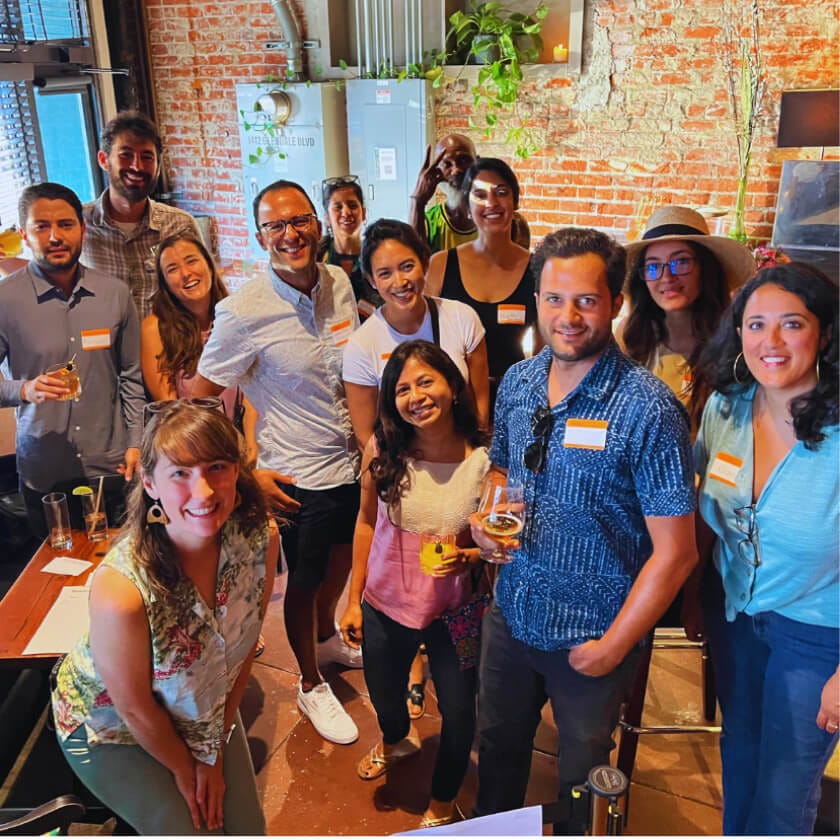In the aftermath of LA’s devastating fires, a letter-writing campaign urges politicians to prioritize long-term resilience over short-term convenience.

chatted with Shan Gupta, founder of the community-building platform HeyClimate, which is organizing the Rebuild L.A. S.A.F.E. letter campaign in coordination with Resilient Palisades and Altadena Recovery Team.
Gupta says HeyClimate’s members were hugely concerned when Mayor Karen Bass announced in January that she was suspending LA’s all-electric construction rule (Ordinance No. 187,714) for wildfire-affected communities.
Reckless, shortsighted political expediency is not limited to city hall, however. The Rebuild L.A. S.A.F.E. campaign has become all the more salient given the recent introduction of AB 3061 in the State Assembly. Through “blocking local energy efficiency policies and pausing statewide residential code updates until 2031,” this profoundly regressive, misguided bill “would lock households into higher utility bills while infringing on local authority and putting efficiency, health, and resilience benefits at risk,” according to an assessment by the respected energy think tank RMI.
Los Angeles deserves much better than a backwards business-as-usual rebuild.
As the Rebuild L.A. S.A.F.E. letter notes:
With the 2028 Olympics ahead, LA can show the world how to rebuild proactively. Healing from this tragedy means embracing clean energy, not welcoming back dirty fossil fuels into our communities that make wildfires, heat waves, and storms even more destructive.
The letter campaign is an opportunity for Californians (LA residents and non-residents alike) to show their elected officials they support a better, safer, cheaper alternative: a post-fire recovery and reconstruction that is “Secure, Affordable, Fast, and Electric.”
The only way is S.A.F.E.
“Secure” Gupta explains, is about fireproofing—rebuilding in ways that reduce “the ability for homes, businesses and communities to be engulfed by fire.” This includes using fire-resistant materials and landscaping with native plants. It also means electrification—a shift away from using methane (so-called “natural”) gas as an energy source. Gupta notes that not only does cooking with gas release hazardous indoor pollution—but gas infrastructure such as pipes are also highly flammable and can make wildfires much harder to contain.
“Affordable” is about rebuilding in ways that are more cost-effective—both for homeowners and the city as a whole. “There's obviously a huge amount of costs associated with reinstalling and rebuilding gas lines,” Gupta says. Going all-electric instead of rebuilding with both electric and gas not only involves cheaper construction costs—it also will lead to savings for residents’ utility bills over the long-term.
Gupta notes that increasing numbers of Angelenos are embracing electrification. “When those users move off of gas, you still have all the existing infrastructure of gas that has to be supported,” he says. If the cost of gas infrastructure has to be covered by a shrinking pool of customers, that means bigger and bigger utility bills for those who stay on gas. Because gas increases flammability risk, it also means higher insurance premiums, too.
As the Rebuild LA S.A.F.E. letter puts it:
Every home rebuilt with methane gas (natural gas) is a 30-year commitment to hazardous, outdated, and expensive infrastructure.
Rebuilding with a single energy source–electricity—is therefore clearly the way to go.
“Fast” means ensuring that rebuilding is done as swiftly as possible so that displaced households can resume their lives, at home. “To do that, the research shows you can actually move faster with an all-electric rebuild,” says Gupta. Gupta notes that while Mayor Bass is framing her suspension of the all-electric rule as an effort to slash red tape, such a move will actually “slow down the rebuilding process” because “having to manage two energy sources, both gas and electric, adds more complexity.”
Lastly, there is “Electric” which recognizes that Los Angeles has committed to a “Clean Energy Future”—and that means an all-electric one. Rebuilding all-electric would help bring that clean energy future closer, while ensuring a safer and cheaper recovery from the LA fires.
Climate besties
The Rebuild L.A. S.A.F.E. letter campaign is one of several initiatives that HeyClimate is working on. Originally, the latter grew out of a need to make climate activism more inclusive and accessible to a broader range of Angelenos.
Gupta says, “I was organizing here with Sunrise in Los Angeles back in 2019 through about 2021. And through that experience, I felt like the movement had kind of hit a plateau where we weren't really reaching new people to join the movement—it was the same familiar faces.” That was when he realized “we needed to create a way for people to make climate cool. We needed to make it fun and easy for people to tap into the climate movement, and make it feel like it works for their busy lives.”
To that end, HeyClimate recently launched climatemap.la, an online map of climate events happening in and around Los Angeles. “We're all about amplifying what's already happening and about uplifting what organizations are already doing,” adds Gupta.

HeyClimate also has “a climate action social club,” which is billed as “a fun IRL community for busy, passionate people taking climate action together.” It was through conversations within this club that the idea for the letter campaign as a response to elected officials’ backpedalling on electrification took root.

LA needs you to be S.A.F.E!
Sign on to the letter here, then use this toolkit to spread the word.
Authored by no less than the speaker, Robert Rivas, alongside District 44 (Burbank) Assembly Member David Schultz. Both should know better.







Kudos for S.A.F.E.